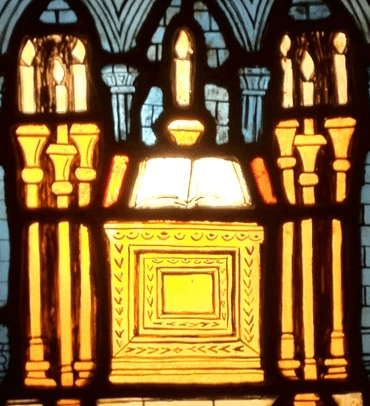Holy

The Bible describes many things as being holy, or sacred. The Ark of the Covenant is one very holy object. The inmost chamber of the tabernacle is called the "Holy of Holies". Things that proceed from the Lord are holy. Objects are holy if they contain something, or represent something, from the Lord. For that reason, the names of the Lord in human languages are holy because they represent qualities of the Lord, things that are Him. The Bible is holy because it contains, interiorly, the Lord's divine truth. The tabernacle of Israel was holy -- not because of the wood or gold or dyed cloth -- but because those things represented qualities that the Lord has. Those same qualities exist, as in an image, in the spiritual states of people who follow the Lord's laws. No person is holy, but if a person's mind contains truth from the Lord and his or her will comes to love the truths and the actions that these truths suggest to him, then his or her mind will contain holy things, because those truths and loves come from the Lord. These things become that person's life and they remain with that person in heaven, after death.
(Reference: Arcana Coelestia 3997, 4091, 8302)
Apocalypse Revealed #76
76. "'I know your works.'" (2:2) This symbolically means that the Lord sees all a person's inner and outer qualities simultaneously.
Works are often mentioned in the book of Revelation, but few know what works mean. This much is known, that ten people may do works which outwardly appear alike, but which are nevertheless not alike within them all, because the works emanate from different ends and different causes, and it is the end and cause that make works to be either good or evil. For every work is a work of the mind. Consequently whatever the character of the mind, such is the character of the work. If the mind is an embodiment of charity, the work becomes an expression of charity. But if the mind is not an embodiment of charity, the work does not become an expression of charity. Yet the two may appear alike outwardly.
Works are visible in their outward form to people, but in their inward form to angels, and to the Lord they appear as they are from their inmost elements to their outmost ones.
Works in their outward form have an appearance not unlike that of unpeeled fruit, while works in their inward form have an appearance like that of the fruit inside the peel, where one finds countless edible parts, and at the center seeds containing once again countless constituents, which are far too small to be seen by the eyes, indeed which surpass the scope of the human intellect.
Such is the nature of all works, whose inward character the Lord alone sees, and which angels also perceive from the Lord when a person is doing them.
But more on this subject may be seen in Angelic Wisdom Regarding Divine Love and Wisdom, nos. 209-220 and nos. 277-281; and also here below, nos. 141, 641, 868.
It can be seen from this that the declaration, "I know your works," means, symbolically, that the Lord sees all a person's inner and outer qualities simultaneously.






